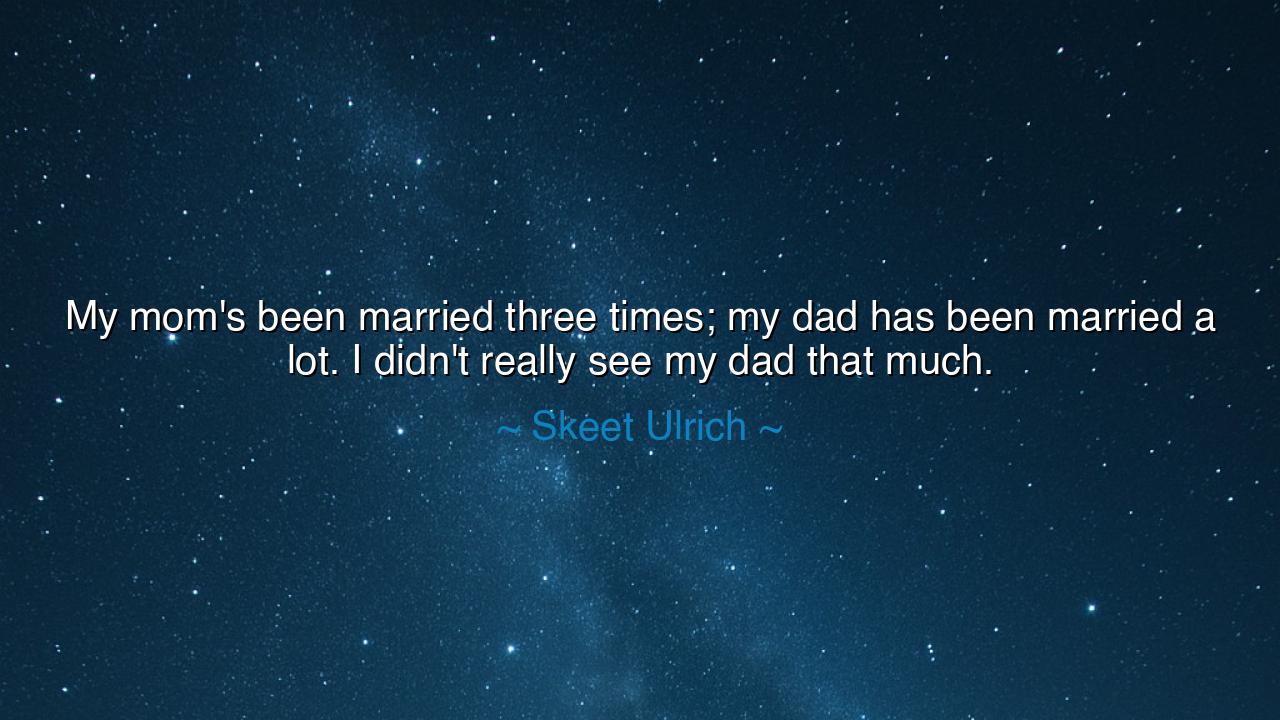
My mom's been married three times; my dad has been married a lot.
My mom's been married three times; my dad has been married a lot. I didn't really see my dad that much.






Hearken, children of reflection, to the words of Skeet Ulrich, who confesses: "My mom's been married three times; my dad has been married a lot. I didn't really see my dad that much." In these words lies a meditation on the impermanence of relationships, the shifting bonds of family, and the quiet longing that arises from absence. Since the days of the ancients, the human heart has grappled with the challenges of fractured households, and with the ways in which love, duty, and presence shape the soul.
The ancients recognized that a child’s experience of family profoundly influences their understanding of trust, attachment, and identity. Cicero wrote that the home is the first school of virtue, where character is shaped not only by instruction but by consistent presence. Ulrich’s observation of his father’s absence, alongside his mother’s multiple marriages, reflects a reality in which constancy is scarce and the lessons of continuity are learned in shadows. The heart, in such circumstances, learns resilience even amidst uncertainty.
Consider the life of Alexander the Great, whose father, Philip II of Macedon, wielded power far from home, leaving young Alexander to navigate his education and formative experiences largely under the care of tutors and advisors. The absence of a parent, though difficult, often cultivates independence, resourcefulness, and inner strength. Ulrich’s words echo this timeless truth: absence, though painful, can awaken a latent courage and self-reliance that the constant presence of a parent might not have demanded.
Yet the quote also speaks to the human longing for connection. The repeated marriages of his mother and the frequent absence of his father illuminate the fragility of bonds and the weight of unfulfilled desire for guidance and companionship. In the tragedies of Sophocles, we see similar themes: children navigating lives shaped by parental absence or discord, forced to confront the world with both grief and fortitude. The sadness inherent in Ulrich’s experience is a common thread through the ages, a reminder that human hearts crave stability and recognition.
This reflection teaches that the measure of parental influence is not solely in presence, but in the quality of the connections we forge. Even when a father or mother is physically absent, the values instilled, the example given, and the love expressed when possible leave lasting imprints. Marcus Aurelius, though often separated from his father’s guidance, absorbed wisdom from tutors, mentors, and observation, learning the principles that would guide his rule. Ulrich’s narrative demonstrates that absence, while challenging, does not wholly negate growth and understanding.
The lesson is profound and enduring: in the face of absent or fractured relationships, one must cultivate inner strength and seek guidance from those who are present and reliable. Life will not always offer perfect family structures, yet resilience, empathy, and self-reflection provide the tools to navigate complexity. It is within these trials that character is forged, and the capacity for understanding, compassion, and independent thought is awakened.
Practical actions follow naturally. Recognize and honor the feelings of loss or longing that arise from parental absence. Seek mentors, friends, or supportive figures who can offer guidance, love, and wisdom. Reflect upon the lessons your parents did impart, even amid absence, and cultivate the strength to care for yourself and others. Transform the gaps of presence into opportunities for growth, awareness, and resilience.
Remember, children of the ages, that the tapestry of family is often imperfect, threaded with absence, longing, and shifting alliances. Skeet Ulrich’s words illuminate the universal struggle of navigating love and loss within the family, teaching that independence, self-reliance, and emotional resilience can blossom even in the shadows of absence. In embracing these lessons, one honors both the past and the enduring potential of the human spirit.






AAdministratorAdministrator
Welcome, honored guests. Please leave a comment, we will respond soon